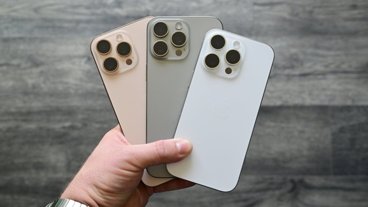A US federal judge has shut down some attempts by Apple and AT&T to dismiss a class action lawsuit that accuses the two of violating antitrust law with their iPhone exclusivity agreement, pushing the complaint closer to a possible trial.
However, it also grants dismissals to some claims of "unfair and deceptive" practices in jurisdictions outside of the states of California, New York and Washington, where Apple and the two original plaintiffs reside.
Submitted nearly one year ago, the original lawsuit begun by Paul Holman and Lucy Rivello charges the companies with allegedly maintaining unfair AT&T exclusivity for the iPhone until at least 2012 and hiding some of the after-sales costs of ownership. It also claims that Apple has locked the handset's software in such a way that use with other carriers, or even the use of third-party software on and for the phone, would be rendered impossible.
Apple is further accused of deliberately engineering iPhone 1.1.1 and other updates to break modified firmware and discourage some users.
In the dismissal, Judge Ware finds that many of the arguments made by Apple and AT&T to throw out the complaint run afoul of either the law or don't directly address the nature of the issue. Apple contends that customers were aware of entering an agreement for just two years and are still under those terms, and so aren't yet in a position where they could legally contest being locked to AT&T; that doesn't matter, according to the decision, as the claim is that customers weren't told that they may have no choice but to use AT&T for iPhone service for as many as three years after the contract expires.
The judge also heads off a motion by Apple to dismiss the case based on the company's recent addition of support for third-party apps in iPhone firmware 2.0. The real issue is an allegation that Apple knowingly limiting access to certain functions where it has a "financial interest," the ruling explains.
Other sections of the document also note that the claims fraud and trespass, both of which would have occurred by ruining modified iPhones, aren't necessarily invalidated by Apple's advance warning of possible damage to hacked phones by applying 1.1.1 or even the need to willfully download and install the update. Customers were reportedly never told at the beginning that potentially damaging updates could come in the future.
Judge Ware centers his dismissals of AT&T's claims around the cellular carrier's insistence on taking any disputes over iPhone contracts to arbitration. While AT&T believes that anyone who signed an iPhone contract affected by the lawsuit would also have agreed to arbitration and thus invalidated any right to file a lawsuit, the judge asserts that AT&T is violating laws in each of the three relevant states that make "unconscionable" any attempts to quash lawsuits by forcing out-of-court dispute settlements.
The lawsuit has the potential for further conflicts should the plaintiffs decide to modify their complaint or encounter further motions from the defendants, but for now is on track to a case management discussion among the involved parties on November 17th.
The conference will lay out the groundwork for discovering information relevant to the case that may reveal some of the inner workings of the exclusivity deal between Apple and AT&T: neither company has ever publicly described how long the iPhone will be available solely to AT&T in the US. At best, observers have had an uncorroborated claim by USA Today that would give AT&T exclusive rights until 2010, which is longer than the first iPhone contracts but two years ahead of the lawsuit's concerns.
Word of the judge's ruling was first reported by Law360.
 Katie Marsal
Katie Marsal






-m.jpg)






 Charles Martin
Charles Martin
 Wesley Hilliard
Wesley Hilliard
 Stephen Silver
Stephen Silver
 William Gallagher
William Gallagher

 Marko Zivkovic
Marko Zivkovic
 Andrew Orr
Andrew Orr
 Amber Neely
Amber Neely








66 Comments
Good Lord, don't these clowns have anything better to do with their time? Go poison some pigeons in the park.
So let me get this straight, people are suing because they installed unauthorized software on their phone thereby voiding the warranty, and when Apple provides an update designed to work only on unhacked phones, the people with hacked phones are complaining?
Also, if you have an issue with a phone not working on another carrier after the 2 year contract is up, why don't you go suing Verizon and Sprint for their locking down phones on their respective CDMA networks.
Get a f*ing life.
Imagine if the courts forced Apple to RE-introduce the security bugs that 1.1.1 fixed
I'm a little lost on this. Why pick on Apple for phone/carrier exclusivity when there are plenty of other carriers doing the exact same thing? Look at the iPhone knockoffs exclusive to Verizon and T-Mobile. When Motorola came out with their first Razr, did they not do the exact same thing? Right or wrong, complain about the entire industry doing it than just one.
I remember how Apple made a rather big effort with public announcements that if your iPhone was jailbroken, or unlocked the updates could/would disable your phone. Those monkeys went ahead and rolled the dice and now come back to whine about why Apple did this, or that, or whatever. The software was hacked outside of Apple's control, and it's their fault?
I can imagine buyers of that Psystar garbage suing Apple if one of their updates renders their computer unusable.
Lawyers have just way too much time on their hands.
I remember the community quickly came up with a fix for restoring the broken baseband. So it wasn't like people who updated were screwed permanently. It was all reversible.